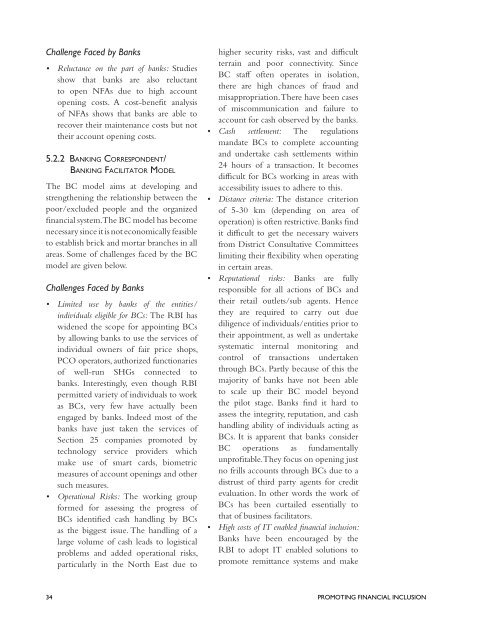Promoting Financial Inclusion - United Nations Development ...
Promoting Financial Inclusion - United Nations Development ...
Promoting Financial Inclusion - United Nations Development ...
Create successful ePaper yourself
Turn your PDF publications into a flip-book with our unique Google optimized e-Paper software.
Challenge Faced by Banks<br />
• Reluctance on the part of banks: Studies<br />
show that banks are also reluctant<br />
to open NFAs due to high account<br />
opening costs. A cost-benefit analysis<br />
of NFAs shows that banks are able to<br />
recover their maintenance costs but not<br />
their account opening costs.<br />
5.2.2 BANKING CORRESPONDENT/<br />
BANKING FACILITATOR MODEL<br />
The BC model aims at developing and<br />
strengthening the relationship between the<br />
poor/excluded people and the organized<br />
financial system. The BC model has become<br />
necessary since it is not economically feasible<br />
to establish brick and mortar branches in all<br />
areas. Some of challenges faced by the BC<br />
model are given below.<br />
Challenges Faced by Banks<br />
• Limited use by banks of the entities/<br />
individuals eligible for BCs: The RBI has<br />
widened the scope for appointing BCs<br />
by allowing banks to use the services of<br />
individual owners of fair price shops,<br />
PCO operators, authorized functionaries<br />
of well-run SHGs connected to<br />
banks. Interestingly, even though RBI<br />
permitted variety of individuals to work<br />
as BCs, very few have actually been<br />
engaged by banks. Indeed most of the<br />
banks have just taken the services of<br />
Section 25 companies promoted by<br />
technology service providers which<br />
make use of smart cards, biometric<br />
measures of account openings and other<br />
such measures.<br />
• Operational Risks: The working group<br />
formed for assessing the progress of<br />
BCs identified cash handling by BCs<br />
as the biggest issue. The handling of a<br />
large volume of cash leads to logistical<br />
problems and added operational risks,<br />
particularly in the North East due to<br />
higher security risks, vast and difficult<br />
terrain and poor connectivity. Since<br />
BC staff often operates in isolation,<br />
there are high chances of fraud and<br />
misappropriation. There have been cases<br />
of miscommunication and failure to<br />
account for cash observed by the banks.<br />
• Cash settlement: The regulations<br />
mandate BCs to complete accounting<br />
and undertake cash settlements within<br />
24 hours of a transaction. It becomes<br />
difficult for BCs working in areas with<br />
accessibility issues to adhere to this.<br />
• Distance criteria: The distance criterion<br />
of 5-30 km (depending on area of<br />
operation) is often restrictive. Banks find<br />
it difficult to get the necessary waivers<br />
from District Consultative Committees<br />
limiting their flexibility when operating<br />
in certain areas.<br />
• Reputational risks: Banks are fully<br />
responsible for all actions of BCs and<br />
their retail outlets/sub agents. Hence<br />
they are required to carry out due<br />
diligence of individuals/entities prior to<br />
their appointment, as well as undertake<br />
systematic internal monitoring and<br />
control of transactions undertaken<br />
through BCs. Partly because of this the<br />
majority of banks have not been able<br />
to scale up their BC model beyond<br />
the pilot stage. Banks find it hard to<br />
assess the integrity, reputation, and cash<br />
handling ability of individuals acting as<br />
BCs. It is apparent that banks consider<br />
BC operations as fundamentally<br />
unprofitable. They focus on opening just<br />
no frills accounts through BCs due to a<br />
distrust of third party agents for credit<br />
evaluation. In other words the work of<br />
BCs has been curtailed essentially to<br />
that of business facilitators.<br />
• High costs of IT enabled fi nancial inclusion:<br />
Banks have been encouraged by the<br />
RBI to adopt IT enabled solutions to<br />
promote remittance systems and make<br />
34 PROMOTING FINANCIAL INCLUSION

















